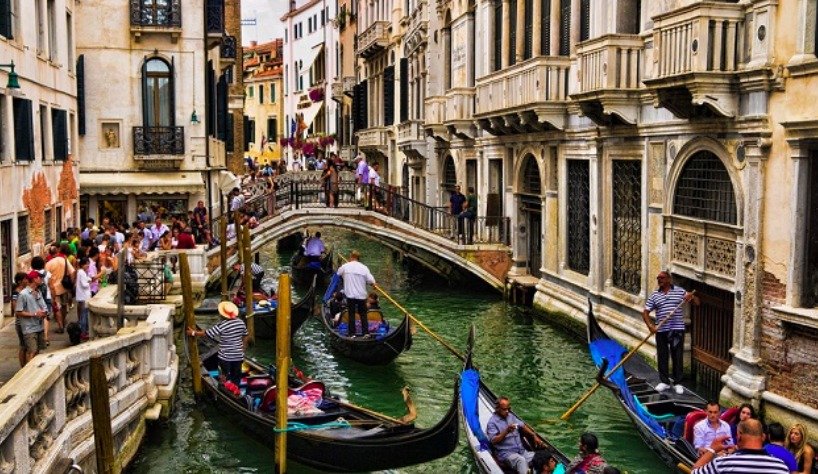 Commissario Brunetti is the Italian version of American TV’s Detective Columbo, though less dishevelled and less bumbling. For textbook tourists, Donna Leon’s detective Brunetti series is perfect because…
Commissario Brunetti is the Italian version of American TV’s Detective Columbo, though less dishevelled and less bumbling. For textbook tourists, Donna Leon’s detective Brunetti series is perfect because…

…the setting for all his cases is the city of Venice. For those who’ve been to it, it is a re-visit to the tourist jewel of the northern Adriatic. To those who have never been to it, her books are an irresistible attraction to this incredible tourist mecca.
Synopsis
Donna Leon is an American expat who moved to Venice and lived there for most of her adult life. She worked as a journalist eventually becoming an author of tremendously entertaining crime novels each set in Venice. In each one of her stories, Leon examines and describes some current issue plaguing the amazingly unprincipled Venice. Sometimes corruption, sometimes immigration, always intriguing and always based on fact and the reality.
The Temptation of Forgiveness is about city crime, theft by professionals who are part of the daily commercial life of the city. The crime is really an expose of how larcenous and greedy people can be. No matter how poor the victim, how old or what their social status may be, there is a criminal who will take advantage of anybody. Leon explains that these criminals can even be members of the respected and highly regarded medical profession.
In the twenty-seventh novel in Donna Leon’s bestselling mystery series, a suspicious accident leads Commissario Guido Brunetti to uncover a longstanding scam with disturbing unintended consequences
The memorable characters and Venetian drama that have long captivated Donna Leon’s many readers are on full display in The Temptation of Forgiveness. Surprised, if not dismayed, to discover from his superior, Vice-Questore Patta, that leaks are emanating from the Questura, Commissario Guido Brunetti is surprised more consequentially by the appearance of a friend of his wife’s, fearful that her son is using drugs and hopeful Brunetti can somehow intervene. When Tullio Gasparini, the woman’s husband, is found unconscious and with a serious brain injury at the foot of a bridge in Venice after midnight, Brunetti is drawn to pursue a possible connection to the boy’s behaviour. But the truth, as Brunetti has experienced so often, is not straightforward.
As the twenty-seventh novel unfolds in Donna Leon’s exquisite chronicle of Venetian life in all its blissful and sordid aspects, Brunetti pursues several false and contradictory leads while growing ever more impressed by the intuition of his fellow Commissario, Claudia Griffoni, and by the endless resourcefulness and craftiness of Signorina Elettra, Patta’s secretary and gate-keeper. Exasperated by the petty bureaucracy that constantly bedevils him and threatens to expose Signorina Elettra, Brunetti is steadied by the embrace of his own family and by his passion for the classics. This predilection leads him to read Sophocles’ Antigone, and, in its light, consider the terrible consequences to which the actions of a tender heart can lead.
Richard comments
Leon snags the reader’s attention from the very start as she describes how immigrants find incredibly innovative schemes to obtain drivers licenses for unqualified immigrants. Intriguing and fascinating how devious the strategies are in order to achieve the goal, again demonstrating the ingenuity and creativity of people in pursuit of objectives which they feel are unattainable via legitimate procedures.
As always, our lead protagonist Commissario Brunetti displays an erudite mind that enjoys reading about ancient Italy and Greece as a basis to better understand how the criminal minds work. As enjoyable as Leon’s descriptive forays into the Venetian society and its daily life are, her Venetian canvas of the city is one of colour, dynamics and vibrancy. She writes about the bars, deliciously enjoyable cafes particular to every Italian city. One visit converts any North American into an espresso loving passionista for the tastes of the indescribably heartwarming and comforting bars. It’s not the espressos, nor the pastries, nor the newspaper reading. It’s the ambience, the feeling of being a part of the Italian culture, the Italian way of life. Every returning tourist who has experienced a “bar” understands. And Commissario Brunetti reinforces the pleasure of that socio-cultural pastiche vividly, charmingly and romantically as he visits his favourites while working his police beat.
Brunetti has a supporting staff of characters who give colour to the Venetian canvas in which his story unfolds: his superior’s secretary, Elletra, the sultry office employee whose amazing tech skills are so tantamount to uncovering deeper details of Brunetti’s cases and the details about the victims and the crime scenes; his cohort of fellow officers from the perceptive constable Vianello to near clairvoyant officer Claudia Griffoni whose social and communicative skills could charm the pitchfork from the devil himself. The polarization and relationship Brunetti demonstrates for his superior Patta could easily be the basis of a doctoral thesis for a psychology student.
Leon’s novel lulls a little at mid-canal as she delves deeper and deeper behind the scenes but if a reader has been to a large Italian city, Venice in particular, the environment, the city’s ambience takes hold and keeps the reader’s attention. Only in Venice, ambulances are speedy boats that navigate and dodge the canal traffic of barges, gondolas, taxis and water buses carrying their patient to the hospital. Only in Venice, can the feeling that history lives among the populace and between the canals, every day, in every corner and on every dank floor of every building.
Leon’s Brunetti series is verbal pasta for the Italian starved tourist. It is a smorgasbord of sugo and spaghetti feeding the hunger of every aficionado of detective stories. Her Brunetti series really are buon gusto for those who yearn for good crime stories with an Italian flare.
Buon appetito.









